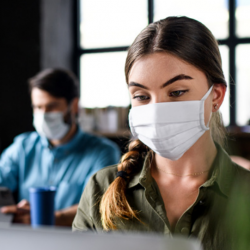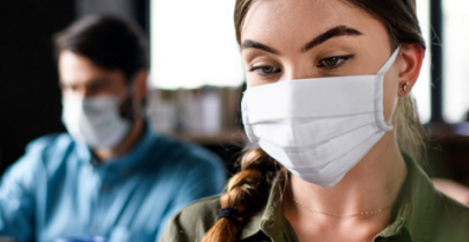January 19, 2021
Improving air quality is key to making people feel safer
 Improving air quality in the fight against COVID-19 could give businesses the edge over their competitors and attract more customers, according to a top UK university scientist. Writing in a new report for facilities services provider phs Group, Cambridge University Professor Paul Linden highlights the growing evidence for the airborne transmission of coronavirus and that tackling indoor air quality must be at the forefront of creating COVID-safe environments.
Improving air quality in the fight against COVID-19 could give businesses the edge over their competitors and attract more customers, according to a top UK university scientist. Writing in a new report for facilities services provider phs Group, Cambridge University Professor Paul Linden highlights the growing evidence for the airborne transmission of coronavirus and that tackling indoor air quality must be at the forefront of creating COVID-safe environments.
The phs Index report was created by air-care specialists at phs and highlights how COVID-19 can spread through the air, alongside research about how consumers feel about spending time in indoor settings. It claims that as many as 68 percent of consumers are concerned about catching COVID-19 in indoor environments, whether in shops, restaurants, public transport or their workplace. And nearly half (49 percent) are so concerned they simply do not want to spend time in indoor environments because of the risk while over a quarter (26 percent) say they don’t trust the measures put in place within premises are enough to protect them.
The findings are a stark warning to organisations in the midst of another lockdown with a return to business closures and home working. As organisations reassess how to safely welcome people back into their buildings once restrictions ease, more are looking towards air cleaning as part of their infection control measures to tackle the airborne risk of transmission; a risk that has previously been overlooked.
In the phs report, Prof Linden explains: “A lot of the focus to date has been on the transmission of physical touch and droplets which are expelled when an infected person breathes, talks and coughs. But what we’re not talking about enough is the smaller infected aerosols which remain airborne once breathed out and are not contained by masks. Growing evidence indicates infected aerosols can linger in the air for up to hours at a time and provide a viable route for COVID-19 transmission. Unfortunately, this means that by only focusing on the ‘Hands, Face and Space’ message, we risk of leaving a gap in our defences – despite best efforts. Improving indoor air quality must be at the forefront if we truly want to create COVID-19-safe environments.
[perfectpullquote align=”right” bordertop=”false” cite=”” link=”” color=”” class=”” size=””]”Comprehensive infection control is absolutely critical to the safe reopening and day-to-day running of organisations”[/perfectpullquote]
“The solution is in reviewing ventilation to ensure an adequate supply of fresh air and increasing the number of air changes within a room. It’s not just about opening a window, although that will always help, it’s about monitoring the flow of air and introducing both natural and mechanical ventilation measures which complement each other. By doing this, we’re improving the quality of the air, reducing the number of particulates and infected particles and subsequently reducing the risk of infection.
“Good indoor air quality is going to be so important I even envisage a commercial opportunity where businesses that actively improve their air quality could certify this with a Kitemark-style system, giving them an edge and attracting more customers.”
One method of improving air quality is through the use of air purifiers. These work by physically removing impurities from the air, including germs viruses and such as colds and flu, pollutants, allergens, VOCs and odours and can change the air within a room up to five times in just one hour. As COVID-19 is still such a new virus, it’s too early for the evidence to guarantee air purifiers eliminate it. However, the evidence to date is very promising.
Astley Shields, of phs Group, added: “Comprehensive infection control is absolutely critical to the safe reopening and day-to-day running of organisations and it’s clear from the evidence we can no longer ignore the risk of the airborne transmission of COVID-19. Used in partnership with hygiene measures including regular hand washing, sanitisation, cleaning and social distancing, air cleaning creates a robust line of defence. This will not only create cleaner indoor environments but demonstrate an organisation’s commitment to its staff, visitors and customers, making them feel safer and boosting confidence. Only by taking proactive measures such as these will organisations be able to reopen safely and welcome back staff, visitors and customers with confidence.”
Image:phs
























